Trivia about Native Philippine Orchids XII
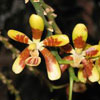 | Phalaenopsis fuscata Phalaenopsis fuscata has short, erect stems. The leaves are slender, ovobate, up to 30 cm long, 6 cm wide, greyish green. The few-flowered inflorescence is spreading, bent to nearly pendent, up to 40 cm long, longer than the leaves. The flowers are fleshy, shiny wax-like, about 30 mm in diameter. The margins of the sepals and petals are bent backward. The lip is three-lobed; the middle part has a central keel; the front part is shell-formed. The pollinarium has two cleft pollinia. |
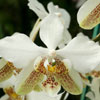 | Phalaenopsis stuartiana Phalaenopsis stuartiana has a little less intensively mottled leaves compare to P, schilleriana, some plants being nearly pure green. They are green below and up to 35 cm long. The inflorescences are many-flowered, erect to overhanging, branched, and up to 75 cm long. The flowers, which reach 70 mm in diameter, are white to yellowish. The lateral sepals and the lip bear numerous brownish spots. The lip is three-lobed; the mid-lobe has a callus between the lateral lobes and in the apical part are anchor-like appendages. The pollinarium has two cleft pollinia connected to a stipe with a large viscidium. |
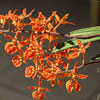 | Renanthera monachica Renanthera monachia has stiff, long and loosely leafed stems. The thick, leathery leaves grow 15 to 19 cm long and 1 to 2 cm wide. The usually unbranched inflorescence is longer than the leaves. The luminous, orange and red spotted flowers reach 35 mm in diameter. The lip is small with a short spur and inconspicuous lateral lobes. The pollinarium has four unequal, hemispherical pollinia. |
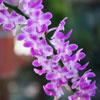 | Aerides quinquevulnera Aerides quinquevulnera is characterized by the red tip of all floral parts. The relatively large plant has leaves measuring up to 35 cm long, which often hang down due to their weight. The pendent inflorescence can be as long or longer than the leaves. The many flowers are densely clustered on the upper part of the inflorescence; they are about 2 cm across. The pollinarium has two unequally cleft pollinia on a slender stipe. |
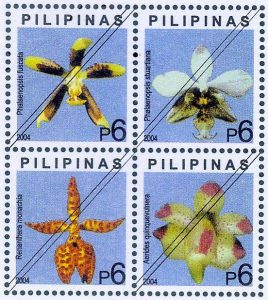
Recent Comments